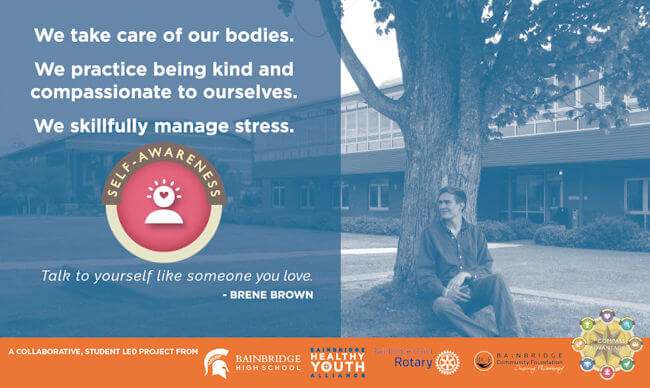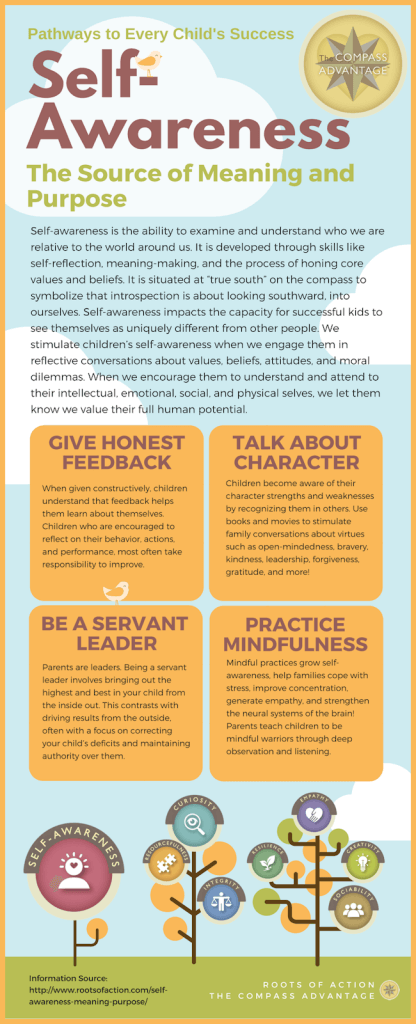
The concept of self-awareness has intrigued philosophers since the dawn of antiquity.
In today’s world, it’s a term that can easily be dismissed as frivolous self-absorption, or even worse, narcissism.
Yet, self-awareness is a core ability that helps us gain a deeper understanding of how we think, feel, and act so we can increase learning and develop meaningful relationships. It’s our ability to examine and understand who we are relative to the world around us.
How does self-awareness evolve? How does it facilitate meaning and purpose in children? How do parents foster self-awareness? This article explores answers to these questions and provides practical, research-proven ways to contribute to kids’ learning and life success.
Why Self-Awareness Is Important to Your Child’s Success
Today, research shows that self-awareness is critical to academic success, positive relationships, and happiness. It is an ability that evolves during childhood and is a key part of healthy brain development.
Most adults understand that when we reflect on how we learn, we become better learners. For example, some people think and process information best in a quiet library; others focus better surrounded by familiar noise or music. Learning strategies that work for understanding finances may be different from those we use when tackling a new software program. The same is true for children.
With greater awareness of how they acquire knowledge, children learn to regulate their behavior to optimize learning. They begin to see how their strengths and weaknesses affect how they perform. The ability to think about one’s thinking is what neuroscientists call metacognition. As children’s metacognitive abilities increase, research suggests they also achieve at higher levels.
Metacognition plays an important role in all learning and life experiences. Beyond academic learning, when children gain awareness of their own mental and physical states, they begin to answer important questions: How do I live a happy life? How do I become a respected human being? How do I feel good about myself? Through these reflections, they also begin to understand other people’s perspectives.
At a recent international workshop, philosophers and neuroscientists gathered to discuss self-awareness and how it is linked to metacognition. Associated with the paralimbic network of the brain, scientists believe self-awareness serves as a “tool for monitoring and controlling our behavior and adjusting our beliefs of the world, not only within ourselves, but, importantly, between individuals.” This higher-order thinking strategy actually changes the structure of the brain, making it more flexible and open to even greater learning.
Psychologists consider self-awareness a critical aspect of human development because of its role in helping us glean meaning from life experiences. That meaning is what helps children find purposeful careers, activities, and friendships. Self-awareness is interconnected with each of the other abilities of The Compass Advantage. Metacognitive abilities, like self-awareness, evolve like most others — through practice.
Below are ways you can start today to increase your child’s awareness of self!
Students from Bainbridge High School in Washington State chose the photo, words, and quote for the above SELF-AWARENESS banner — one of seven that hang in the hallways of their school to remind all students of the core abilities that matter most to their development and well-being.
10 Ways to Boost Your Child’s Self-Awareness
1. Give honest feedback.
Let go of the myth that giving children critical feedback will harm their confidence and self-esteem. When given constructively, children understand that feedback helps them learn about themselves. Children who are encouraged to reflect on their behavior, actions, and performance, most often take responsibility to improve. Dr. Heidi Grant Halvorson provides helpful feedback guidelines for parents in the article, The Art (and Science) of Giving Your Kids Feedback.
2. Reverse negative thinking.
Positive words translate into optimism and self-belief. Unfortunately, children’s brains are more aware of negative messages. These thoughts interfere with healthy development and give kids a false and negative sense of themselves. Explore the practices that help children learn to think positively and ways parents nurture positivity through everyday conversations.
3. Facilitate meaning.
To become aware of themselves, children must self-reflect. It is through reflection that we make meaning from our experiences and learn about the nature of humanity. American philosopher and psychologist, John Dewey, suggested four ways to foster awareness in children and adolescents, including how to invite kids into deeper conversations. When parents engage children in dialog about meaning, they become curious about themselves and desire growth.
4. Practice mindfulness.
The practice of mindfulness within families is powerful in so many ways. It grows self-awareness, helps us cope with stress, improves concentration, generates empathy, and strengthens the neural systems of the brain! Parents help children become mindful warriors when they teach them BOLD skills: (B) Breathe deeply; (O) Observe; (L) Listen; and (D) Decide. Learn more about BOLD skills. Also discover how families with children with ADHD benefit from mindfulness.
5. Talk about character.
Children become aware of their own character strengths and weaknesses by recognizing them in others. Use books and movies to stimulate family conversations about virtues such as open-mindedness, bravery, kindness, leadership, forgiveness, gratitude, and a host of other aspects of human character. Watch movies with your teens that help them become aware of and articulate the core abilities in The Compass Advantage.
6. Be a servant leader.
Parents are leaders. Being a servant leader involves bringing out the highest and best in your child from the inside out. This contrasts with driving results from the outside, often with a focus on correcting your child’s deficits and maintaining authority over them. Learn how to be a servant leader to children.
7. Welcome confusion.
The act of being confused and identifying one’s lack of understanding is an important part of developing self-awareness. Take time at the end of a challenging day to ask, “What was most perplexing or puzzling about today?” This not only jump starts metacognitive processing, but also creates a family culture that acknowledges confusion as an integral part of learning.
8. See benefits of failure.
Research indicates that how parents respond to their children’s failures shapes kids’ mindsets about their own intelligence. For example, when parents respond to a poor test grade with anxiety, they convey a message that intelligence is fixed. Parents who instead focus on learning from a poor grade signal that intelligence can be improved. Learn more about developing a growth vs. a fixed mindset, and why a growth mindset helps kids engage in reflective thinking about how they learn and grow.
9. Challenge biases.
Human biases, or prejudices, get in the way of healthy development and often fog self-awareness. Parents create a family culture for deep learning when they encourage dialogue that challenges biases. Conversations about biases and moral dilemmas related to politics, wealth, racism, poverty, justice, liberty, etc., help family members “think about their own thinking.” Learn how to understand and work on biases with yourself and children.
10. Honor the tough moments.
While most parents would like to see and keep their children happy, life is filled with many difficult and traumatic challenges. Rather than depressing emotional and physical responses to pain and suffering, parents who recognize and honor those tough times help children develop into healthy, self-aware adults. Children can heal from traumatic life experiences. Families can find meaning through loss and grief. Healing begins from within.
Self-Awareness Infographic
The following infographic was created from the material in this article. Please feel free to copy, print, and share it with others!
Learn More About Self-Awareness
Check out the following books to learn more about self-awareness and why it’s so important to your child’s success and well-being:
Man’s Search for Meaning, by Viktor E. Frankl
The Power of Now, by Eckhart Tolle
Presence: Bringing Your Boldest Self to Your Biggest Challenges, by Amy Cuddy
The Book of Awakening: Having the Life You Want by Being Present to the Life You Have, by Mark Nepo
Get Out of Your Mind and Into Your Life for Teens: A Guide to Living an Extraordinary Life, by Joseph Ciarrochi, Louise Hayes, and Ann Bailey
Articles in this Parenting Series
Successful Kids Need 8 Core Abilities: How to Parent With Purpose
Curiosity: How Parents Foster Lifelong Learning in Children
Sociability: How Families Learn Together with Love and Respect
Resilience: How Families Grow from Adversity
Self-Awareness: How Parents Foster Meaning and Purpose in Kids (Currently Reading)
Integrity: How Families Teach and Live their Values
Resourcefulness: How Parents Help Children Achieve Goals
Creativity: How Parents Nurture the Evolution of Children’s Ideas
Empathy: How Families Lead with Gratitude and Kindness
Free Resources for Parents
My Parenting Promise: a frame-ready document that helps reinforce the compass abilities through parenting practices.
I Have a Dream: a frame-ready document created by youth — to discuss with your children.
Reframing Success: Helping Children & Teens Grow from the Inside Out: an eBook that introduces The Compass Advantage. This eBook has been widely used by schools as a “Book Club” reading to engage parents about raising healthy children and teens.
Photo Credit: Bainbridge Healthy Youth Alliance
Published: January 2, 2017





